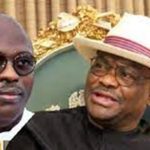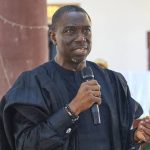NITEL was an evil company and I am happy it died – El-Rufai, exposes how NITEL wasted $7bn for 400,000 lines
 Mallam Nasir El-Rufai current Governor of Kaduna State was at a time the Director General of the Bureau of Public Enterprises (BPE) where he midwifed the birth of the bill that set the tone for telecom revolution in the country. He shared his experience with Nigerian and international audience at the opening of the Nigerian Pavilion at ITU World Bangkok.
Mallam Nasir El-Rufai current Governor of Kaduna State was at a time the Director General of the Bureau of Public Enterprises (BPE) where he midwifed the birth of the bill that set the tone for telecom revolution in the country. He shared his experience with Nigerian and international audience at the opening of the Nigerian Pavilion at ITU World Bangkok.
Just a few days ago, I was reflecting and I asked a friend of mine how we managed to survive without mobile telephones. We wanted to visit a friend and we tried to reach him to tell him we were on our way but his phone was switched off. We reached his wife and we finally found he was at home. And I was wondering how inefficient the world used to be without the mobile phone because in those days you won’t be able to make such a call so you travel all the way only to find out that the man is not at home and you have to go back.
This is just an example of how ubiquitous these services have become and I remember in 2000 when we were trying to push through the reforms of the telecoms sector and everyone was opposed to us; NITEL was opposed to any reforms because they were very happy with 400,000 telecoms lines to nearly 100 million people at that time. The National Assembly was quite happy because NITEL had a lot of power; they gave out contracts and had very powerful contractors who took care of everybody and so no one wanted reforms or change.
The only islands of reform were in the BPE. Even the NCC was so disempowered because under the NCC Decree of 1992 the NCC could only regulate the telecoms industry but not NITEL. It was a very comfortable relationship and everyone was happy it was not working and telecoms service was difficult to get so that there was a racket in getting phone lines. But in the BPE we pushed ahead. The NCC Act that you see now was not written in the Ministry of Justice but in the BPE; we wrote that law and pushed it before the National Assembly but we realised in the BPE that part of the problem was that Nigerians have never experienced how a good phone company properly works.
The only phone company they knew was NITEL and I approached President Olusegun Obasanjo at that time asking him for a favour and convincing him that we needed to have a major telecoms player in Nigeria just to show Nigerians how bad NITEL was, because not many people believed that NITEL was bad but it was an evil company and I’m glad it died. NITEL had taken $7 billion of Nigeria’s resources only to give the country 400,000 lines; the most expensive phone network in the world. I believe that NITEL was an evil company and had to be dismantled somehow but I didn’t know how to go about it
I convinced Obasanjo to set up a meeting for BPE to make a presentation to Vodafone which was the largest mobile phone company in the world at that time. So he used his friendship with Prime Minister Tony Blair to arrange for us and the Minister of State for Communications, the late Alhaji Haruna Elewi, to go to London and make a presentation about opportunities in investing in telecoms in Nigeria.
In our presentation, we offered to Vodafone a nationwide GSM licence for one dollar and a five-year tax holiday just so that we can have additional networks to Mtel and NITEL. Vodafone listened and they took our presentation, promising to get back to us in two weeks. Three weeks later they wrote a letter to the President that they were unable to accept our invitation because from the data available to them, the size of Nigeria’s GSM market was 5 million subscribers in 3 years. I tried to get to Vodafone to tell them that they were wrong in whatever method they used in arriving at that assumption. They probably used the GDP per capita of the country to arrive at their figure which makes it wrong. They’re wrong because 90 per cent of Nigeria’s economy is not measured in the GDP but it is informal.
Most economic actors in Nigeria are not captured in the statistics, so our real GDP is 9 to10 times the official GDP. I told them that if they come to Nigeria that within one year they’ll have 5 million subscribers. They wrote back to say they were not interested, that the market was too small and too unattractive and there’re no incomes to support the GSM networks.
We lost that opportunity and we went ahead with the Communications Act and got it passed in 2003. But before then we persuaded the President under certain arrangement to empower the NCC to auction the licences. The law was not there but administratively it was allowed and the President was kind enough to appoint one of his trusted and closest friends; Ahmed Joda, to chair the NCC Board which gave it a lot of credibility. But before then, we did some mathematics in the BPE and realised that unless we did something about the tariff we may not have bidders.
At that time, by September 2000, NITEL was approaching insolvency; they were not generating enough cash to cover their cost and we came up with a number that telephone tariffs needed to be increased (domestic phone tariffs not International). International phone tariffs was excessive; NITEL was using international revenue to subsidise domestic calls so we said that has to stop and we proposed that domestic phone tariffs must go up by 141 per cent.
NITEL was opposed to it; they didn’t like that because they wanted to remain insolvent because they know that as a government company the government will bail them out, but we pushed ahead.
This is again one of President Obasanjo’s leadership qualities; he looked at the numbers and said we should do it and the Minister of Communications was asked to announce the increase in tariff but he refused so the BPE had to announce the increase in tariff. This was one of the reasons Obasanjo had to remove the minister immediately for blatantly disobeying the President.
It was this increase in tariffs that enabled MTN, Econet then of Zimbabwe, and Glo come in to be. And we saw the licence that we offered Vodafone for a dollar, one year later we were giving out these licences for $285 million and today of course the rest is history. We raised the tariffs and the first SIM card that was sold by MTN was sold for N10, 000. But what is the situation today? The essence of my story is to let us know that the opportunities in Nigeria are almost beyond limit; voice has matured but for data we have not even scratched the surface. There’s a huge market for broadband and going forward the IoTs (Internet of Things). There’re so many opportunities for infrastructure, smart cities, states and the nation at large.
There’s so much we can do that cannot be seen from our data which is misleading and wrong. We have 180 million people in Nigeria today, this will go to 450 million by 2050. Nigeria will be the third largest country in the world in terms of population. These people have to talk and Nigerians love to talk. They love to connect, the opportunities are huge and we must all do whatever we can to get serious international companies to look in the direction of our country.








